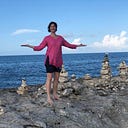
A playfully serious guide to surviving time travel technology in the coming era
It was 1979, I was a precocious 10 year-old, and I was in love with Lewis Carroll’s Symbolic Logic and the Game of Logic; a purple-and-green paperback my parents had left lying around. These were actually two books bound as one. You could read one book at the front, and when you got stuck on a problem, you could read the other book at the back. By the time you came back to the book at the front, your earlier problem would be solved. Though I remember being irritated that the print wasn’t upside-down in the book at the back like the new Devo retrospective, what I loved was that the two books met at the middle, mimicking the way the future and past feel when they meet in the now. That feeling of “folded time” seemed to charm this book with a magical vibration, at least from my child-self’s viewpoint.
Aside from that magical book, I had many formative dreams that shaped my scientific career towards becoming a time travel researcher and technologist. Two I will share here, as they became especially relevant to my future. In one, I was 14, it was the 1980s, and I worried a lot about the threat of nuclear war.
I dreamed I was shown a room with a desk and a chair. A voiceover in the dream calmly told me, “Time is like a room. If you want to avoid bumping into the chair when walking across the room, you can do that — but you have to know that there is a chair and where that chair is in the room.”
After that, I was no longer afraid of nuclear war. The solution was easy. We already knew nuclear war was a risk, we just had to avoid the paths or timelines that would lead to it. Operationalizing the solution was hard, of course, but that’s beside the point.
That dream inspired me to take seriously Minkowski’s idea that time holds all physical events in perpetuity — all physical events in the past, present and future co-exist in a “block-like” universe with no change or real movement. Well, the dream used Minkowski’s idea plus it also gave the suggestion that we can navigate a block of spacetime using information about the…
